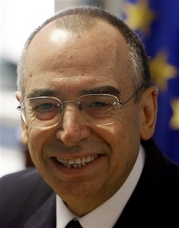Taken from Yahoo News, 20.11.06
By MARIA SANMINIATELLI, Associated Press
ROME - The government on Monday replaced the head of Italy's military intelligence agency, who was under investigation for the alleged CIA abduction of an Egyptian cleric and links to a fake dossier that purported to show Iraq tried to buy uranium ahead of the U.S.-led invasion.
In a major sweep, Nicolo Pollari was replaced as the head of the military intelligence agency SISMI, and the chiefs of the civilian secret service agencies were also removed. The leaders of the two other services were not named in the scandals, and the government insisted the changes were part of a broader overhaul of intelligence agencies.
"After a few years these positions of delicate responsibility must find their natural rotation," Premier Romano Prodi told the Apcom news agency.
"This had been waiting to happen for months," said Aldo Pigoli, an intelligence and international relations analyst in Milan. "In the past few months an agreement had formed that ... without too much noise there was a need for a replacement."
After he leaves SISMI, Pollari will receive "an important special assignment" reporting directly to Prodi, the premier's office said. The change takes effect Dec. 16.
Pollari had long resisted calls for his resignation.
In 2005, news reports in the leftist daily La Repubblica alleged he knowingly passed forged documents to the United States suggesting Saddam Hussein had been seeking uranium in Africa — information used to bolster the case for the invasion of Iraq.
Pollari denied SISMI had any hand in disseminating the fake dossier, which detailed a fictitious Iraqi deal to buy 500 tons of yellowcake uranium from Niger.
Calls for his resignation intensified after he became the highest-ranking Italian official named in the investigation into a Muslim cleric's kidnapping, and was questioned by prosecutors in July.
Prosecutors in Milan recently renewed their request for Italy to ask Washington to extradite 26 Americans — all but one believed to be CIA agents — in the alleged 2003 abduction of Osama Moustafa Hassan Nasr, also known as Abu Omar.
He was supposedly snatched as he walked down a Milan street as part of a CIA "extraordinary rendition" program in which terrorism suspects are transferred to third countries, where some allegedly are tortured.
The cleric was reportedly flown out of northern Italy from a military base in Aviano, and, according to the prosecutors, eventually taken to Egypt, where he says he was tortured.
Prosecutors allege that Pollari and other top officials of SISMI worked with the Americans to abduct the cleric.
Two of Pollari's top aides, Gustavo Pignero and Marco Mancini, were arrested this summer and other SISMI officials were placed under investigation. Pignero has since died of cancer, while Mancini is said by his lawyers to be cooperating with prosecutors in implicating his boss.
Pollari has insisted in questioning before parliamentary committees that Italian intelligence had no role in Nasr's disappearance.
Conservative leader Silvio Berlusconi, who was in power at the time of the alleged abduction, has staunchly defended Pollari, maintaining that his government and SISMI were not informed of the alleged operation and did not take part in it.
Prodi's center-left government has refrained from backing the allegations against Pollari, but has been more lukewarm in its defense of the spy chief. It has maintained the question of whether Italy was told by its American allies of their supposed plan to kidnap Nasr is protected as a state secret.
Pollari, 63, took the helm of SISMI in 2001 after holding key posts with Italy's financial police and civilian secret service agency.
In 2005, he dealt with the fallout over the shooting death in Iraq of top officer Nicola Calipari, who was killed by U.S. gunfire as he traveled by car to Baghdad airport with a newly freed Italian hostage. The incident strained relations between Italy and the U.S., and the countries issued separate reports on the incident after failing to agree on a shared version of events.
Pollari will be replaced by Admiral Bruno Branciforte, 59, a fleet commander and former head of navy intelligence who has served as navy attache in Washington and as the Italian representative at U.S. Central Command during the war in Afghanistan.
Gen. Mario Mori, an officer from Carabinieri paramilitary police, was replaced at the helm of the domestic intelligence agency SISDE by Franco Gabrielli, a top anti-terrorism police official. Gen. Giuseppe Cucchi, a retired army officer with experience in local and international military politics, succeeds Emilio Del Mese at the coordinating body CESIS.
Monday, November 20, 2006
Italy Replaces Intelligence Chief
Subscribe to:
Post Comments (Atom)





No comments:
Post a Comment